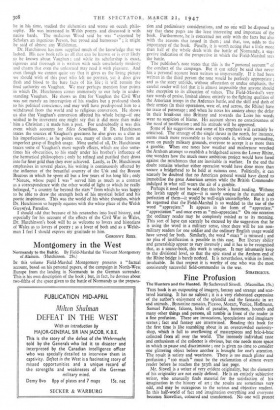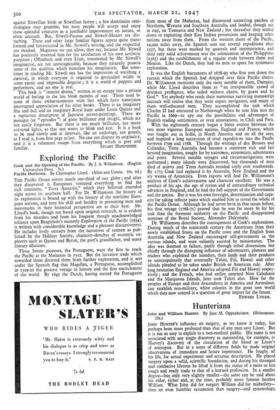Fine Profusion
The Hunters and the Hunted. By Sacheverell Sitwell. (Macmillan. 15s.) THIS book is an outpouring of imagery, fantasy and strange and scat- tered learning. It has no subject ; it is a very elaborated expression of the author's enjoyment of the splendid and the fantastic in art and animals. , Byzantine mosaics, Picasso, Mozart, Venice, Hoffmann, Samuel Palmer, falcons, birds of paradise, huntsmen, hounds and many other things and persons, all tumble in front of the reader in a fine profusion. There are invocations, speculations and imaginary scenes • fact and fantasy are intertwined. Reading. this book for the first time is like stumbling about in an overcrowded curiosity- shop, which is full to overflowing of masterpieces and brit-i-brae collected from all over the world. The intensely individual taste and enthusiasm of the collector is obvious, but one needs more space in which to pause and discriminate ; one is given no time to consider one glittering object before another is brought for one's attention. The result is satiety and weariness. There is too much glitter and profusion • " too much" must be the exclamation of almost every reader before he reaches the 313th and last page.
Mr. Sitwell is a writer of very evident originality, but the elements of his originality are not easily defined. He is an entirely subjective writer, who unusually finds material for the satisfaction of his imagination in the history of art ; the results are sometimes very odd, and may be outrageous to the serious and objective student. In this hail-world of fact and imagination everything and everyone becomes Sitwellian, coloured and transformed. No one will protest
against Sitwellian birds or Sitwellian horses ; a few doctrinaire orni- thologists may grumble, but most people will accept and enjoy these splendid creatures as a justifiable improvement on nature, so often uncouth. But, Sitwell-Picasso and Sitwell-Mozart are dis- turbing. These and other large familiar figures appear quite trans- formed and fantasticated in Mr. Sitwell's writing, and the respectful are shocked. Magnasoo we can 'allow, they say, because Mr. Sitwell has positively invented him for the satisfaction of his own aesthetic purposes ; Offenbach and even Liszt, transmuted by Mr. Sitwell's imagination, are not unrecognisable- because they naturally possess some of the qualities which stimulate his imagination. But some- times in reading Mr. Sitwell one has the impression of watching a carnival, in which everyone is required to gesticulate wildly in some exotic and impossible disguise ; it is a world of puppets and performers, and no one is real. This book is " interior drama," written as an escape into a private world of feeling in the last bleak months of war. There need be none of those embarrassments with fact which have sometimes interrupted appreciation of his other books. There is an imaginary fête and ball and an imaginary Royal hunt under Louis Quinze and a rapturous description of Japanese screen-paintings. There are passages (or "episodes ") of great brilliance and insight, which ate not easily forgotten. But there is too much brilliance, too many coloured lights, so that one wants to blink and rest. It is a book to be read slowly and at intervals, like an anthology, not grossly, as I read it, from first page to last. No one can dispute its originality, and it is a vehement escape from everything which is grey and



































 Previous page
Previous page